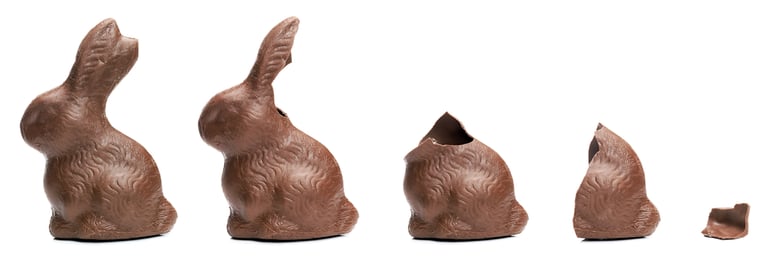.jpg)
Easter is upon us, and is a time to relax, enjoy the beauty of spring and indulge in chocolate treats! However, we must be mindful of our dental health, especially as fewer than three in ten children saw a dentist last year! Even before the pandemic, dental decay was the top reason for 5–9 year olds to be admitted to hospital, so dentists fear numbers may rise this year. As dentists are open and safe to visit, reinstating regular dental check-ups will help prevent problems developing. Call our Welcome Team on 01252 713797 or
click to request a callback online.
 1. Cut back and confine sweet treats to meal times only
1. Cut back and confine sweet treats to meal times only
If you eat chocolate and sweet treats throughout the day, this puts teeth under constant attack by acid-producing bacteria, increasing your risk of cavities and tooth decay. We recommend cutting back on the amount of chocolate and sweets eaten while at home and over Easter, and only eating them at meal times.
If possible, substitute milk chocolates with high cocoa content chocolates (over 75%), as they have shown to promote some oral health benefits. Eating cheese after chocolate can help neutralise plaque acid, helping to prevent tooth decay; snacking on celery, carrots or apples can help dislodge sticky chocolate and caramel from teeth, minimising the contact time of plaque acid with tooth enamel.
Substitute your chocolate treats with low sugar alternative.
You should brush your teeth at least twice a day for at least two minutes using toothpaste containing ≥1450ppm fluoride, as this helps protect teeth from cavities. However, you must spit not rinse when you’ve finished brushing, to avoid washing the protective fluoride away.
Interdental brushes or dental floss can be used to remove sticky plaque from in between your teeth. It’s important to supervise children’s brushing, and to remind family of all ages to brush their teeth thoroughly before they go to bed, even during this unsettling time.
Watch hygienist Gillian show you how to clean your teeth at home.
Establishing regular meal times can help with routine over this time. A diet balanced in vitamins, minerals, fresh fruit and vegetables is good for your overall health as well as helping to prevent tooth decay and gum disease. Take time to cook new and healthy recipes, and ensure you have some rest days from alcohol.
Remember to drink plenty of water to keep your body hydrated and your mouth healthy; drinking water after each meal or snack helps wash away food particles from your teeth and prevents dry mouth and bacterial growth that leads to tooth decay. Fluoridated tap water additionally strengthens teeth enamel and helps prevent cavities.
Being at home or working during this difficult time can be damaging to your mental health and well-being. We have previously shared a guide written by Psychology Tools giving practical advice on managing worry and anxiety during uncertain times.
Here are some useful tips taken from this guide:
As before, we are really grateful to Psychology Tools for allowing this to be freely shared.
Just to update you that due to current legislation and guidance concerning the coronavirus, we have closed our clinic to non-urgent and routine dental care. For dental emergencies, you can ca
